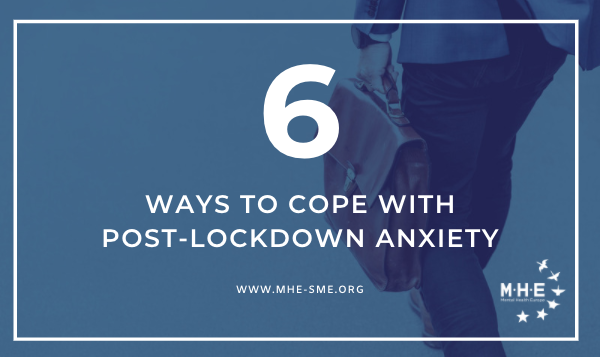6 ways to cope with post-lockdown anxiety

After months of lockdown and isolation, you may have mixed feelings about returning to a “new normal”. The prospect of going back to school, work or simply meeting friends for a drink can feel daunting and overwhelming. Mental Health Europe compiled a list of tips to help you manage your nerves around life after lockdown. This guide is part of a series about ways to cope and look after your mental health during the pandemic. You can see more tips in other short guides “Coronavirus: 8 ways to look after your mental health”, “10 ways to cope with stress during the pandemic” and “5 wellbeing tips for the holiday season”.
1. Focus on what you can control
Anxiety can often be fuelled by the unknown. The pandemic, lockdown restrictions and slow return to post-lockdown societies are causing a lot of uncertainty. You may not be able to control the coronavirus situation or what lies ahead, but you can always control how you deal with it. In this instance, focusing on what you can control can be helpful.
While you cannot control how long the pandemic will last or how other people will behave, there are still a number of things you can control. Whether limiting your news and social media intake, following coronavirus rules or finding little fun things to do for yourself – no matter how dire the situation might look, you always have the power to focus on what you can control.
See Healthline’s tips for life after lockdown >>
2. Take your time and set boundaries
It is okay if you need more time to get used to post-lockdown life. After months of lockdown and isolation, it might feel strange at first to meet with friends and colleagues in person. Make sure you listen to your needs and take things step by step. If you feel overwhelmed by social interactions, set your boundaries and give yourself time to process new experiences.
If you feel like you need an extra week or two working from home, take as much time as you need to feel comfortable going back to work. Throughout the whole process, be patient with yourself.
This has been an unprecedented time for everyone. It is completely valid if you feel nervous and worried about the future. Remember that you are not alone in this. Many people are having similar doubts and fears. Feeling anxious about change is normal, so be kind to yourself.
Learn more about coping with post-lockdown anxiety >>
3. Acknowledge your feelings
Allow every feeling, but do not let it consume you. You might experience a variety of feelings while easing back into life after lockdown. What can help is being mindful and attentive to your feelings. Remember that every emotion is a temporary notion. It is natural and, in fact, very human to feel anxious about change.
Journaling can be a helpful way to process and acknowledge your feelings. Simply taking 5 minutes each morning to note down how you are feeling today can help you feel better. It will also provide a morning routine that has a positive impact on your mental wellbeing. Talking to others, doing something creative or practising meditation – there are many ways to express your feelings.
Learn these 8 Tips for Coping with ‘Reopening Anxiety’ >>
4. Plan activities
Planning fun activities with friends, colleagues, or your family is another useful way to help you cope with anxious feelings. On the one hand, having a plan and knowing exactly what you will be doing might calm you down. On the other hand, rediscovering old hobbies with friends like sports, baking or doing something creative can make it easier for you to enjoy life after lockdown. Again, focusing on what you can control, such as activities you enjoy doing, can give you a sense of certainty during uncertain times.
Find out how others are managing their nerves around life after lockdown >>
5. Enjoy your loved one’s company
Some days might be tougher than others but remind yourself that you do not have to go through this on your own. Having a support system of family and friends is vital for coping with a challenging time in your life, like post-lockdown life. Having regular meetings or calls with your loved ones can be an immense source of support. Now that coronavirus restrictions are easing, and more and more people have been vaccinated, take time to appreciate in-person interactions with your loved ones. A conversation or simply hugging a loved one can have a positive impact on your mental health.
Learn about these five lessons to remember when lockdown ends >>
6. Seek professional support
Even if you try all the listed tips, sometimes you might feel like you need professional support to help you cope with your feelings. Please remember, there is always help available. Next to therapy options, peer support groups are another helpful mental healthcare options that can help you deal with your fears in a safe space. Mental Health Europe (MHE) created a map of helplines and services from 36 European countries to support your mental health during the COVID-19 crisis and beyond.
Check out MHE’s map of helplines and services to support your mental health during COVID-19 >>
Stay connected
Get our latest news, personal stories, research articles, and job opportunities.